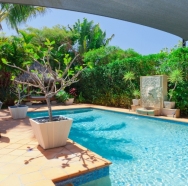France-Mauritius Tax Treaty: what are the benefits for French taxpayers?

Considering investing in Mauritius? This tropical haven attracts more and more French investors, seduced by its paradise landscapes, dynamic economy, and attractive tax regime.
If you are one of these savvy investors, you are probably wondering what tax advantages you can expect by investing in Mauritius. Rest assured, the France-Mauritius tax treaty is here to guide you!
Signed in 2003 and revised in 2021, this treaty establishes a favorable tax framework for French taxpayers who invest in Mauritius. It aims to avoid double taxation and facilitate tax exchanges between the two countries.
But what exactly are the advantages of this treaty for French investors? That is exactly what we will explore in detail in this comprehensive and informative article. We will guide you through the different aspects of the treaty, clearly and precisely explaining the tax advantages you can benefit from.
Whether you are an experienced real estate investor or a novice, this article will help you understand the ins and outs of the France-Mauritius tax treaty and make informed decisions for your investments in Mauritius.
Ready to discover the exceptional tax opportunities offered by the France-Mauritius treaty? Join us on this fiscal journey and optimize your investment strategy!
Tax advantages of the treaty for real estate income
Investing in real estate in Mauritius is a wise choice for many French. Beyond the idyllic living environment that the island offers, Mauritian real estate presents a major asset: its attractive tax regime, particularly advantageous for French investors thanks to the bilateral tax treaty.
Exemption from Wealth Tax (ISF)
First significant advantage: real estate located in Mauritius is exempt from the French Wealth Tax (ISF). This means that you do not have to pay tax on the value of your Mauritian properties, even if you are a French tax resident.
Taxation of rental income
Another major advantage: rental income generated by your real estate in Mauritius is taxed at a fixed tax rate of 15%, much lower than the progressive tax rate applicable in France. This preferential rate applies directly at the source, which means that you will not suffer any withholding in Mauritius and you will not have to pay additional tax in France.
Recovery of French tax
The tax treaty allows you to recover part of the French tax paid on your rental income. Indeed, you can deduct from your French tax the tax credit corresponding to the Mauritian tax already paid on these revenues.
Concrete example
Let's assume you receive annual rental income of 100,000 euros from your real estate in Mauritius. In Mauritius, you will pay a tax of 15% on these revenues, i.e., 15,000 euros. In France, you must also declare these revenues, but you can deduct the tax credit corresponding to the 15,000 euros already paid in Mauritius.
In summary, the France-Mauritius tax treaty allows you to make significant tax savings on your real estate income in Mauritius.
Note:
To benefit from these advantages, it is essential to comply with the conditions of the tax treaty, particularly regarding tax residence and ownership of real estate.
It is also recommended to approach a specialized tax advisor to obtain personalized advice and ensure you fully understand all the tax implications of your real estate investment in Mauritius.
Investing in real estate in Mauritius can prove to be a very interesting wealth strategy. The France-Mauritius tax treaty is an additional asset that makes this destination even more attractive for French investors.
Do not hesitate to contact us to learn more about the real estate investment opportunities in Mauritius and the tax advantages related to the France-Mauritius treaty.
Tax advantages of the treaty for other types of income
While real estate is a privileged investment field for the French in Mauritius, the bilateral tax treaty is not limited to this type of income. Indeed, it also offers significant tax advantages for other types of income, such as dividends, capital gains from the sale of securities, and retirement pensions.
Dividends:
Dividends received by French residents from Mauritian companies are subject to French income tax. However, the tax treaty allows reducing the tax rate applicable to these dividends to 15%, compared to 30% or more in France. This preferential rate applies directly at the source, which means that you will not suffer any withholding in Mauritius and that you will only have to pay a tax supplement in France, if necessary.
Capital gains on the sale of securities:
Capital gains from the sale of securities of Mauritian companies made by French residents are normally taxable in France. However, the tax treaty allows them to be totally exempt from tax in France under certain conditions, particularly if the Mauritian company is held by more than 25% by the French taxpayer or by a company he controls.
Retirement pensions:
Retirement pensions received by French residents from Mauritian sources are taxed in France. However, the tax treaty allows them to be taxed at a preferential rate in France, generally lower than the normal tax rate applicable to retirement pensions.
In summary, the France-Mauritius tax treaty offers significant tax advantages for various types of income, in addition to real estate income. These advantages can significantly reduce your overall tax burden and make your investment in Mauritius even more attractive.
Note:
As with real estate income, it is essential to comply with the conditions of the tax treaty to benefit from these advantages, particularly regarding tax residence and the holding of securities or investments concerned.
It is also recommended to approach a specialized tax advisor to obtain personalized advice and ensure you fully understand all the tax implications of your investments in Mauritius.
Whether you plan to receive dividends, realize capital gains from the sale of securities, or receive a retirement pension from Mauritian sources, the France-Mauritius tax treaty can allow you to significantly reduce your taxes and optimize your net yield.
Do not hesitate to contact us to learn more about the tax advantages of the France-Mauritius treaty and to explore the investment opportunities in Mauritius that are available to you.
Other advantages of the France-Mauritius tax treaty
Beyond the direct tax advantages related to real estate income and other types of income, the France-Mauritius tax treaty offers several other significant advantages for French investors.
Protection against double taxation
The main goal of the treaty is to avoid double taxation, i.e., the situation where the same income would be taxed both in France and in Mauritius. The treaty clearly identifies in which country each income should be taxed and defines the rules for deduction to avoid you being taxed twice on the same income.
Exchange of tax information
The two tax administrations, French and Mauritian, exchange information about taxpayers resident in the other country to fight against tax evasion. This exchange of information helps to verify the compliance of tax declarations and to detect possible frauds.
Anti-abuse provisions
The tax treaty contains anti-abuse provisions designed to prevent taxpayers from taking undue tax advantage of the treaty. These provisions aim in particular to avoid artificial arrangements and to ensure a fair application of the treaty.
The France-Mauritius tax treaty offers a stable and secure tax framework for French investors in Mauritius. It allows avoiding double taxation, facilitates the exchange of tax information, and fights against tax evasion.
Note:
The provisions of the tax treaty are complex and it is important to be advised by a specialized tax advisor to understand all the implications and ensure they are scrupulously respected.
Compliance with tax rules is essential to benefit from the advantages of the treaty and avoid any risk of penalty.
The France-Mauritius tax treaty is a valuable tool for French investors wishing to optimize their taxation in Mauritius.
Do not hesitate to contact us to learn more about the advantages of the treaty and to assist you in your investment procedures in Mauritius.
Conditions to be met to benefit from the advantages of the treaty
The France-Mauritius tax treaty is a major asset for French investors, but it is important to meet certain conditions to be able to benefit from its advantages.
General conditions
Be a Mauritian tax resident: To benefit from most of the advantages of the treaty, you must be a tax resident in Mauritius. This means that you must have your economic interests center there.
Respect the provisions of the treaty: It is essential to respect all the provisions of the tax treaty, particularly regarding the declaration of income, payment of taxes, and holding of properties or securities concerned.
Have good documentation: You must be able to justify your tax situation and provide all necessary documents to the French and Mauritian tax administrations.
Specific conditions for certain benefits:
Exemption from Wealth Tax
To benefit from the exemption from the Wealth Tax on your real estate located in Mauritius, you must comply with the tax conditions in Mauritius and not have French-source income above a certain threshold.
Preferential tax rate on dividends: To benefit from the preferential tax rate of 15% on dividends received from Mauritian companies, you must hold the securities of these companies for a certain duration and meet certain conditions of presence in Mauritius.
Exemption from capital gains tax on the sale of securities
To benefit from the exemption from capital gains tax on the sale of securities of Mauritian companies, you must comply with the conditions of holding the securities and not have a close link with the Mauritian company.
Preferential tax rate on retirement pensions
To benefit from the preferential tax rate on retirement pensions from Mauritian sources, you must comply with the tax conditions in Mauritius and not have French-source income above a certain threshold.
In summary, it is important to be well informed and advised by a specialized tax advisor before investing in Mauritius and claiming the benefits of the tax treaty.
Do not hesitate to contact us to learn more about the conditions to be met and to assist you in your investment procedures in Mauritius.
Acheter un bien immobilier à Maurice : guide complet pour les étrangers
Toutes les étapes, conseils et démarches pour investir et acheter un bien immobilier à l'île Maurice en tant qu'étranger.
Lire la suiteComment investir dans l'immobilier de luxe à Maurice ?
Découvrez comment investir dans l'immobilier de luxe à Maurice avec notre guide complet. Marché, cadres légaux et stratégies
Lire la suiteImmobilier à Maurice : comment trouver le bien idéal ?
Découvrez comment trouver le bien immobilier idéal à l'Île Maurice dans notre guide complet. Emplacement, budget, démarches administratives...
Lire la suite10 raisons d'investir dans l'immobilier à Maurice
Découvrez les 10 raisons clés pour lesquelles investir dans l'immobilier à Maurice est une opportunité en or.
Lire la suiteInvestir dans l'immobilier locatif à Maurice : les meilleurs endroits et stratégies
Discover the best locations and strategies to maximize your returns and benefit from the dynamism of the Mauritian market.
Lire la suiteObtenir un permis de résidence mauricien par l'investissement immobilier
Obtenez votre permis de résidence mauricien en investissant dans l'immobilier ! Découvrez les démarches à suivre.
Lire la suiteAcheter un bien immobilier à Maurice : quel budget minimum ?
Découvrez tout ce que vous devez savoir sur le budget pour l'achat d'un bien immobilier à Maurice en tant qu'étranger ou résident.
Lire la suiteImmigrer à Maurice : le guide de l’expatriation
Découvrez comment immigrer à Maurice grâce à notre guide complet de l'expatriation. Explorez les types de visas, le marché immobilier, l'intégration.
Lire la suiteConvention fiscale France-Maurice : quels avantages pour les contribuables français ?
Découvrez les avantages fiscaux exceptionnels de la convention fiscale France-Maurice pour les investisseurs français.
Lire la suiteMaurice : nouvelle destination prisée par les nomades digitaux
Découvrez pourquoi Maurice devient une destination de choix pour les nomades digitaux grâce au visa premium et à ses infrastructures
Lire la suiteL'immobilier dans l'Ouest de Maurice
Le marché immobilier de l'Ouest de Maurice et les opportunités d'investissement à Flic-en-Flac, Tamarin et Rivière Noire
Lire la suiteLes frais et taxes associés à l'achat d'un bien immobilier à Maurice
Découvrez tous les frais et taxes associés à l'achat d'un bien immobilier à Maurice.
Lire la suiteInvestir dans l'immobilier à Flic en Flac
Investissez à Flic en Flac : opportunités immobilières, conseils et tendances. Découvrez les meilleurs investissements locatifs.
Lire la suiteGérer son bien immobilier à distance : solutions et conseils pratiques
Explorez des solutions efficaces pour gérer votre bien immobilier à Maurice à distance, et optimiser sécurité et rentabilité
Lire la suiteTop 10 des raisons d'investir dans l'immobilier à Flic en Flac
Découvrez pourquoi investir dans l'immobilier à Flic en Flac, Maurice, est une excellente décision : stabilité, retour sur investissement, qualité de
Lire la suite5 conseils pour réussir votre investissement immobilier à Maurice
Découvrez nos 5 conseils essentiels pour réussir votre investissement immobilier à Maurice, incluant choix de l'emplacement et optimisation fiscale
Lire la suiteFaut-il faire appel à un notaire pour acheter un bien immobilier à Maurice ?
Découvrez pourquoi consulter un notaire pour l'achat immobilier à Maurice est essentiel pour la sécurité et la légalité
Lire la suiteConseils pour bien négocier le prix d'un bien immobilier à Maurice
Les meilleures stratégies pour négocier le prix d'un bien immobilier à Maurice. Conseils pratiques et aperçu du marché.
Lire la suiteMaurice : un havre de paix pour les retraités étrangers
Découvrez pourquoi Maurice est le choix idéal pour une retraite paisible. Immobilier, coût de vie, sécurité et qualité de vie
Lire la suiteL'impact du tourisme sur le marché immobilier à Flic en Flac
Découvrez comment le tourisme influence le marché immobilier à Flic en Flac, idéal pour investisseurs et acheteurs étrangers
Lire la suiteQuartiers en vogue à Flic en Flac pour les acheteurs immobiliers
Découvrez les quartiers en vogue à Flic en Flac, idéaux pour l'achat immobilier. Opportunités pour investisseurs et acheteurs étrangers
Lire la suiteLe marché de l'immobilier de luxe à Flic en Flac
Découvrez les opportunités du marché de l'immobilier de luxe à Flic en Flac, un choix prisé par les investisseurs mauriciens et internationaux.
Lire la suiteAcheter un bien immobilier à l’île Maurice : quelle structure juridique choisir ?
Découvrez les meilleures structures juridiques pour acheter une propriété à l'Île Maurice, adaptées aux résidents et non-résidents.
Lire la suiteLe marché immobilier mauricien en 2024 : analyse et perspectives
Les tendances du marché immobilier mauricien en 2024, les opportunités pour investisseurs et les conseils pour acheter à Maurice
Lire la suiteRéaliser une plus-value immobilière à Maurice : les meilleures stratégies
Découvrez les meilleures stratégies pour réaliser une plus-value immobilière à Maurice. Investissez intelligemment et optimisez votre rentabilité.
Lire la suiteFlic en Flac pour les familles : écoles, services et communauté
Découvrez pourquoi Flic en Flac à Maurice est idéal pour les familles : écoles, services et vie communautaire enrichissante.
Lire la suiteInvestir dans l’immobilier à l’Ile Maurice pour sa retraite
Explorez les avantages d'investir dans l'immobilier à l'Ile Maurice pour votre retraite : qualité de vie, régime fiscal favorable
Lire la suite5 avantages du régime fiscal attractif de l’ile Maurice
Les avantages du régime fiscal de Maurice pour l'achat de propriété. Investissement sécurisé et bénéfices fiscaux attractifs
Lire la suiteFaut-il faire appel à un notaire pour acheter un bien immobilier à Maurice ?
Pourquoi consulter un notaire est essentiel pour acheter une propriété à Maurice, pour locaux et étrangers
Lire la suiteLes programmes immobiliers pour expatriés à Maurice : IRS, RES, PDS et R+2
Découvrez les programmes immobiliers IRS, RES, PDS et R+2 à Maurice pour expatriés. Investissez dans l'immobilier de luxe avec des avantage
Lire la suite





























